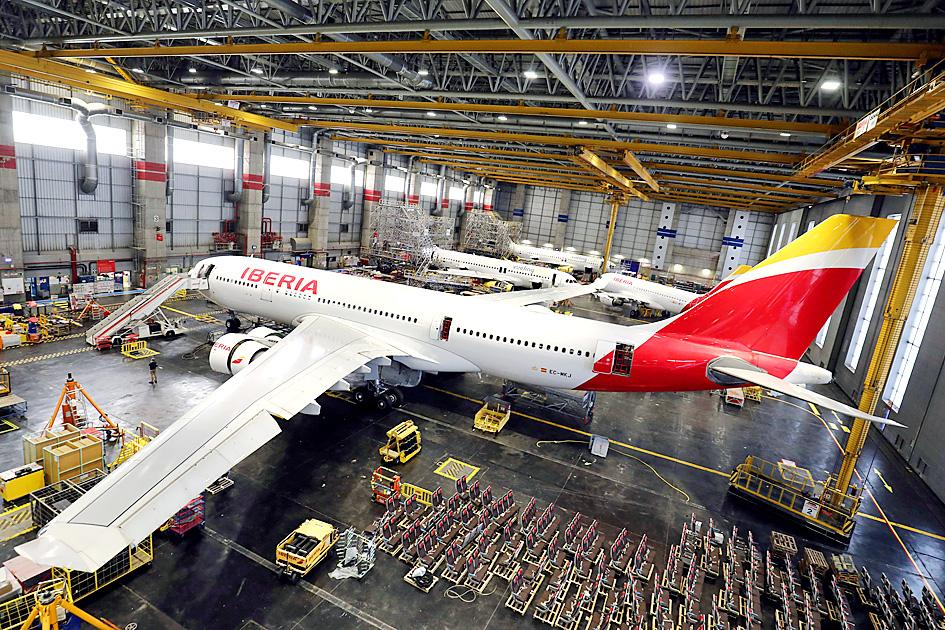Airbus SE posted stronger-than-expected deliveries of 566 jets last year, remaining the world’s largest planemaker as a year of COVID-19 pandemic-induced upheaval for air travel coincided with a grounding crisis at US rival Boeing Co.
Deliveries fell by 34 percent from a record posted a year earlier, when travel demand was riding high on the increasing mobility of consumers in fast-growing markets across Asia.
Now, the aerospace industry is wrestling with the reluctance of most airlines to take delivery of jets as they struggle to save cash and a drop in air traffic that Airbus says could take until 2023 or 2025 to regain the pre-pandemic levels of 2019.

Photo: Reuters
Still, Airbus said it had delivered 566 aircraft last year, exceeding estimates earlier in the year when the COVID-19 crisis led to a lockdown of major travel markets.
“We can be cautiously optimistic for 2021 ... but challenges and uncertainties remain high,” Airbus chief executive Guillaume Faury told reporters.
The planemaker declined to give delivery forecasts for this year ahead of full-year earnings due on Feb. 18.
Airbus sold a net total of 268 aircraft last year after adjusting for cancelations, down from 768 in 2019.
Hampered by the grounding of its best-selling 737 MAX, Boeing delivered 118 jets between January and November last year and had a negative total of 454 net orders before accounting adjustments, giving Airbus an unassailable lead.
Deliveries of the MAX, grounded in March 2019 following two fatal crashes, resumed last month.
Airbus deliveries rose sharply in the second half of last year compared with the first months of the crisis as Airbus made a push for delivery agreements with many airlines, in some cases allowing for temporary storage, according to industry sources.
However, Airbus said virtually all new planes had entered service, even though many were not being flown as intensively as they would have been before COVID-19 upended growth plans.
Faury reaffirmed plans to raise output by 18 percent in the second half of the year, while noting volatility over forecasts, with rising infections offset by accelerating COVID-19 vaccine rollouts.
Cancelations included 10 A350 wide-body jets worth US$3.2 billion at list prices from AirAsia X Bhd.
Airbus said it had taken the decision to cancel the deal, but questions remain over 108 other orders from the troubled Malaysian budget carrier.
Airbus has told a Malaysian court that it stands to lose more than US$5 billion worth of orders as it challenges AirAsia X’s plans to restructure debt.
In total, Airbus lost orders for 26 wide-body jets, reflecting a slump in intercontinental travel that is expected to be the slowest segment to recover.
With the industry’s main showcase, the Paris Airshow, canceled this year, Airbus cautioned that it did not expect a return toward big-ticket jet orders while travel remained depressed.
“It will be a while before we are back on an even keel,” chief commercial officer Christian Scherer said.

CHIP WAR: Tariffs on Taiwanese chips would prompt companies to move their factories, but not necessarily to the US, unleashing a ‘global cross-sector tariff war’ US President Donald Trump would “shoot himself in the foot” if he follows through on his recent pledge to impose higher tariffs on Taiwanese and other foreign semiconductors entering the US, analysts said. Trump’s plans to raise tariffs on chips manufactured in Taiwan to as high as 100 percent would backfire, macroeconomist Henry Wu (吳嘉隆) said. He would “shoot himself in the foot,” Wu said on Saturday, as such economic measures would lead Taiwanese chip suppliers to pass on additional costs to their US clients and consumers, and ultimately cause another wave of inflation. Trump has claimed that Taiwan took up to

A start-up in Mexico is trying to help get a handle on one coastal city’s plastic waste problem by converting it into gasoline, diesel and other fuels. With less than 10 percent of the world’s plastics being recycled, Petgas’ idea is that rather than letting discarded plastic become waste, it can become productive again as fuel. Petgas developed a machine in the port city of Boca del Rio that uses pyrolysis, a thermodynamic process that heats plastics in the absence of oxygen, breaking it down to produce gasoline, diesel, kerosene, paraffin and coke. Petgas chief technology officer Carlos Parraguirre Diaz said that in

Japan intends to closely monitor the impact on its currency of US President Donald Trump’s new tariffs and is worried about the international fallout from the trade imposts, Japanese Minister of Finance Katsunobu Kato said. “We need to carefully see how the exchange rate and other factors will be affected and what form US monetary policy will take in the future,” Kato said yesterday in an interview with Fuji Television. Japan is very concerned about how the tariffs might impact the global economy, he added. Kato spoke as nations and firms brace for potential repercussions after Trump unleashed the first salvo of

SUPPORT: The government said it would help firms deal with supply disruptions, after Trump signed orders imposing tariffs of 25 percent on imports from Canada and Mexico The government pledged to help companies with operations in Mexico, such as iPhone assembler Hon Hai Precision Industry Co (鴻海精密), also known as Foxconn Technology Group (富士康科技集團), shift production lines and investment if needed to deal with higher US tariffs. The Ministry of Economic Affairs yesterday announced measures to help local firms cope with the US tariff increases on Canada, Mexico, China and other potential areas. The ministry said that it would establish an investment and trade service center in the US to help Taiwanese firms assess the investment environment in different US states, plan supply chain relocation strategies and